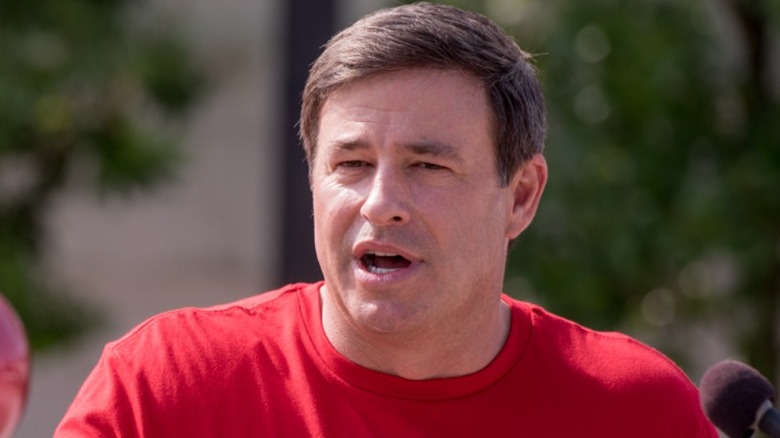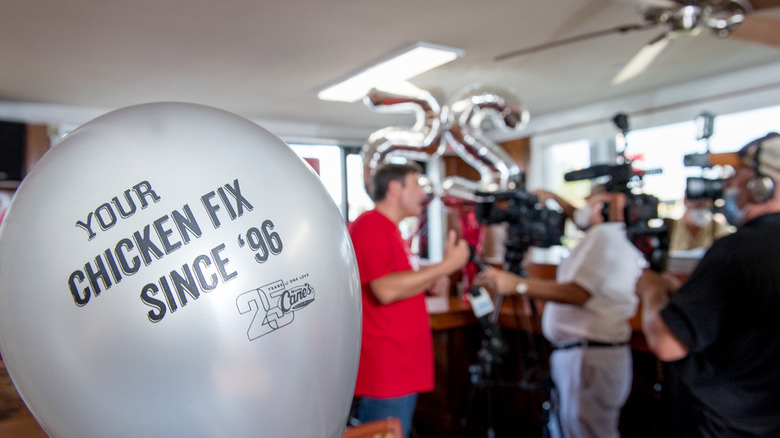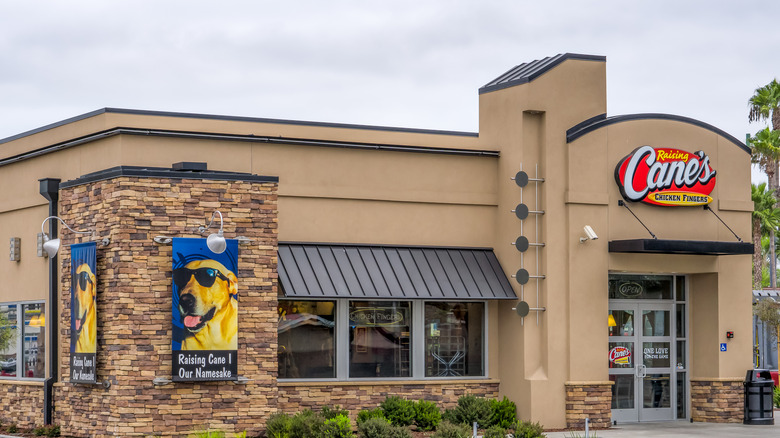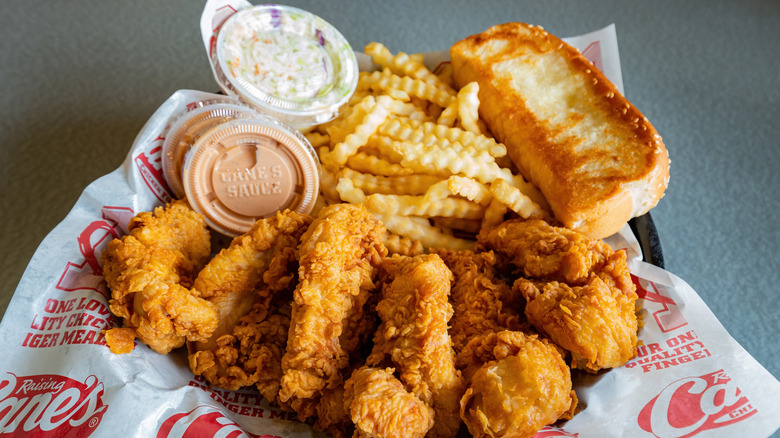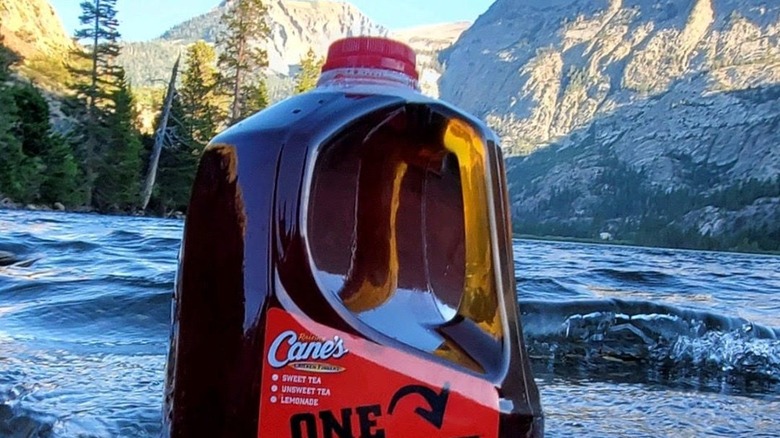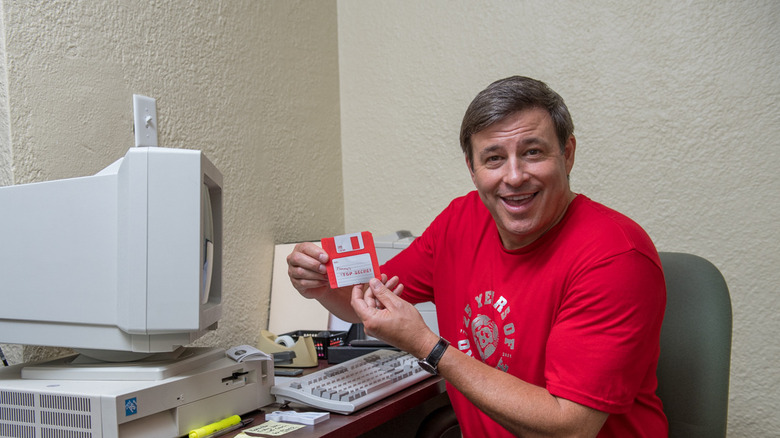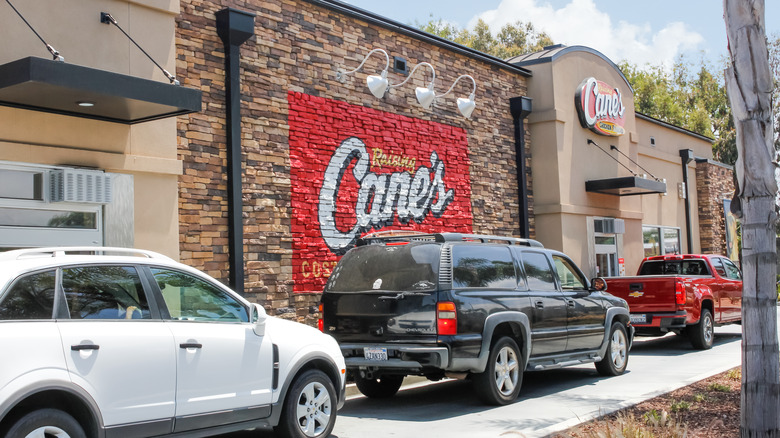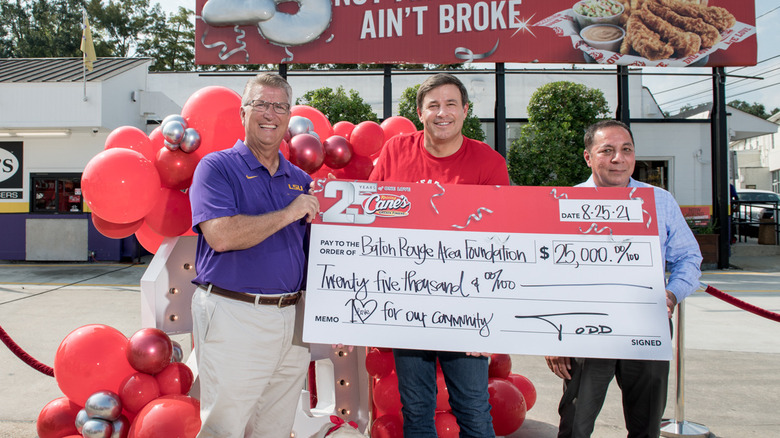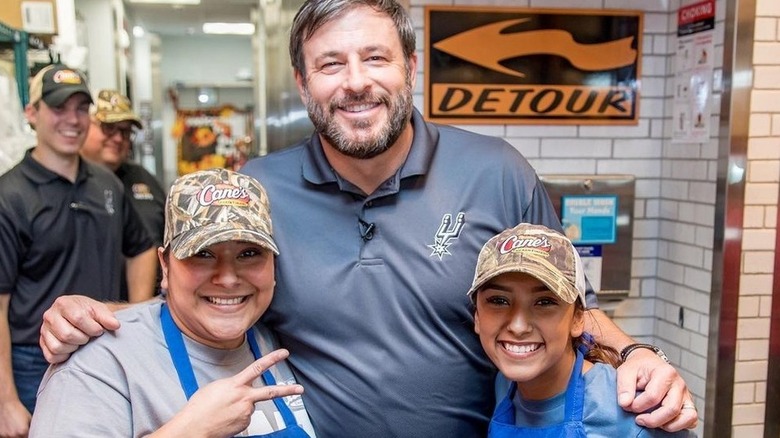Raising Cane's Founder Reveals How The Chain Got Started - Exclusive Interview
If you're a Raising Cane's fan (and what self-respecting fan of chicken fingers isn't?) you likely have many questions about this Louisiana-based purveyor of cravable food, which just celebrated its 25th birthday. Questions such as: "Is the Raising Cane's menu ever going to change?" and, "Why is it called Raising Cane's?" Or, if you're wrapped around the corner in your SUV, waiting to get your crinkle-cut fries fix during the lunchtime rush, perhaps you've wondered, "How can I avoid these long lines?"
Fortunately, Todd Graves, co-founder of Raising Cane's, was happy to answer all of these questions. In an exclusive interview with Mashed, Graves revealed how a business proposal that earned him the worst grade in his Louisiana State University economics class (and attracted zero investors) grew to become the fastest growing restaurant in the chicken category (per Nation's Restaurant News), with 38,000 employees and 570 locations worldwide. Graves also speculated on what we can expect from Raising Cane's over the next 25 years and explained why the chain — which already gave $100 million to its communities over the years — celebrated its milestone anniversary with a $25 million donation to various charities.
How Raising Cane's started with a B- college paper
Congrats on hitting 25 years. That's incredible.
Thank you. It's a big milestone for us. We're really thrilled...When you're always driving forward, a lot of times you don't celebrate your successes or get nostalgic because you're always pushing for great goals. So this is a good time for us to be nostalgic. We're really enjoying it.
So let's take a little trip down memory lane. How did Raising Cane's start, and why do you think it's become as successful as it is today?
Well, this was a college dream. I actually wrote a business plan for Raising Cane's in a business planning class, and I actually got the worst grade in the class. [The] legend later was that it was an "F"... It wasn't that bad; the teacher gave it a B-minus. He was an easy grader ...
Look, I worked in restaurants in high school and college. I knew the business. I knew down to what aprons would cost, you know what I mean, getting laundered. So it was a detailed plan, but the professor said, "Plan's great, but concept ..." He goes, "You really didn't do your homework." At this point, quick-service restaurants were adding a lot of variety, right? They were going to healthy items, they're doing all these things. And he said, "That's where the industry's going." And so he tried to teach a lesson of understanding the industry, but I just believe in doing one thing and doing it better than anybody else, or at least striving to, and focusing on that and being good at what you're good at. So I was like, "No, good food's always going to be in style." Models out there, like In-N-Out Burger, have been doing it since, I think 1948, just staying with that: burger, fries, and shakes.
And so anyway, and it's worked out for 25 years. But look, it got the worst grade in business planning class, got turned down by the banks. Bankers were nice, but [said] the same thing: "Hey, you don't have a lot of experience, you have zero money," things like that.
Raising Cane's co-founder became a fisherman to make his chicken restaurant a reality
If you didn't get money from bankers, how were you able to open Raising Cane's?
I realized I had to make money myself for the project, and that took me commercial fishing in Alaska, working as a boilermaker in refineries in Los Angeles. Look, I would have gone anywhere to make money for it! I was so passionate about this dream I had, but it's fun now that it was Alaskan fishing because it adds to that story better than me working in construction in the Midwest, which wouldn't be too exciting, right?
So those things were fun. And then I came back, and reconstructed an old dilapidated building, and parking lot in the North Gates of LSU and was able to do most of the work myself. We called it the "mothership." It's still my baby today. I live right down the street from it. I spent my whole adult life right around the mothership, the first location.
And then we started there, and what I learned from that was just seeing people come in. That's where I really got into my team and my crew because they worked so hard for my dream. Then I became, wow, really appreciative of that, and then I became really appreciative of the customers that came in. I needed their dollars, and so I wanted to have a good product because I appreciated that. And then the community supported me, like those people at the college, like the band or something. They had a little bit of a budget, they'd come to me. So anyway, we made 30 bucks our first month, and I was thrilled with that because we could pay our rent, I could pay my crew, I could pay people, so it worked. I didn't have any money to not cash flow. You know what I mean?
Anyway, the reason I went elaborating that, those same values I learned there as a young man at 24 have stayed with us through the company the whole time. Basically, we're the story of 25 years of changing absolutely nothing. We haven't changed the menu, we haven't changed our core values and our non-negotiables, so I think there's a lot to be said with sticking to what you know is right. Now, you have to evolve as a company, training programs, POS systems, all that we really do. But when it comes down to serving people good quality, craveable food, and taking care of your crew, to [being] friendly, food safe, clean — it's the basics. That's never going to never not be the competitive advantage! So I think all those things go into why we do so well.
Why is it called "Raising Cane's"?
So we didn't have a good name. The business plan started off as "Folly's Chicken Fingers" because we had a friend that called everybody a "folly," and then it went into, I can't remember, a couple of other names. And then when I got back from Alaska, it's like, "Let's call it Sockeye's Chicken Fingers," because we fished for sockeye salmon.
And luckily, a friend told us that was a terrible idea. Thank goodness. And then my dog, Raising Cane, was going around... [Someone said], "you ought to name it after your dog, Raising Cane, called Cane for short." We went, "That's a good name!" I didn't realize then, too, that this would become a mascot, and we're on the third Raising Cane now, which she's keeping the legacy going.
Todd Graves explains why Raising Cane's menu is so simple
What are the core items on the Raising Cane's menu?
So the chicken fingers and sauce, that's the epicenter, right? And our chicken fingers are the highest quality. It's breast tenderloins — it's not cut strips. It's the breast tenderloins that come underneath the chicken breast. And with that, I like to get the right size bird. It's around a two-ounce tender, and it gets down to a lot of specifics on breeds and all that good stuff, just to have the best, most flavorful chicken. And it's in a brining solution, we say "marinade," but it's a brining solution, for 24 hours, which helps basically to get water retention, to keep it juicy. And then it's hand-battered and breaded in a cook-to-order fashion ... And so it's the highest quality chicken, but the chicken with the sauce, that's the hook, right? The chicken by itself is really good, but with the sauce, that's the craveable part.
But then you have those crinkle-cut fries. I grew up [with] crinkle-cut fries; [I'm] nostalgic. My mother would make that. They'd throw it in the oven or whatever. I like that. The crinkles get it a little more crisp, I think. Like that, down to the grain of salt we use, the cut, everything. It's all those ... details when doing it.
The Texas toast is pull-apart bread. It's not sliced bread where it can get stale. It's like little dough balls put together so they grow — they bake that way — and you pull them apart. It's dense and it's soft and it's moist and it's just garlic butter. People go nuts over it!
And then there's the slaw. And I'm not a coleslaw fan at all. I guess if I was, I might like our slaw. But people are, and it was an old traditional Southern thing to have coleslaw with chicken. I like having it on the menu because most people trade it out for extra toast or extra fries or extra sauce. That's the fun component of it. Most order as "no slaw, extra toast."
You're not a slaw person–does that mean you don't eat the Raising Cane's slaw?
I eat it all the time because I constantly test our food quality. But I take a bite to see it, and that's all I want. That's good enough.
Why you should skip a soda and opt for lemonade or tea at Raising Cane's, according to Todd Graves
Is there one Raising Cane's menu item that you feel is under-rated?
Well, look, we have such a focused menu, you pretty much get what you get. So what I would encourage people to do, though, is rather than get a soda product, which you can get everywhere — we take our tea and lemonade extremely seriously. Even if you don't want the sugar, just our regular tea, we source it from three different countries and we're real serious about the blend and what we do. It took a lot, a lot, of time to get that tea right!
I try just to tell people, "Hey, switch over to that, because there's a lot of thought and care that went into it." We brew it fresh all day. We put it in the aerators to do it. Tea is an art. You're not supposed to keep it long and all these different things, so we have it down. Now, we sell more tea than we do sodas, but you still have a big soda contingency. I just kind of encourage people: "You can get that anywhere, but our tea's special." And then our lemonade's special: just lemons, sugar, and water, and the details have to go down with that. Lemons get more tart different times of the year; sizes [vary]. It's a lot of saying, "Hey, basically how many lemons in this batch to keep it consistent?"
Do you have any changes to the menu planned?
Those are blasphemous words when you're talking about Raising Cane's for 25 years! One love. No ... but, here's an interesting thing. Most people don't know this, but we actually have breakfast in places that we need to do breakfast, right? So the San Antonio airport, the municipality to go in there — and I wanted to be there, I wanted to serve those customers, but they wanted actual breakfast items. [We said], "Well, we can serve our chicken fingers for breakfast." [They said], "No, we want breakfast items."
So we have a chicken finger biscuit that's really, really good. We're going into Union Station in D.C., and we'll be opening later this fall — and, we're doing our chicken finger biscuit. We're just really excited. Our baby cakes, little hash browns, and then some chicken fingers, but [in] a biscuit. We really spent a lot of time on the R&D. We understand toast, but now we really understand biscuits, too. So that's going to be fun and really fun to launch that. [Plus], really good quality freshly ground coffee, so it goes with our freshly brewed tea, things like that.
It's kind of like matching that quality for that in the morning. I'm curious to see how it does. I really am. No plans to move it to street-side locations for breakfast, but in areas like that. Las Vegas Boulevard, Times Square, places like that are really kind of 24 hours. It might be where we have a period of [time of] having a chicken finger biscuit — which, as you know, chicken biscuits are really popular.
Here's why Raising Cane's sauce recipe will always remain a secret
Is your sauce made in-house?
It's made in-house every day, so that makes the difference. I think it's night and day difference [compared to] the pre-packaged peel off. And I'm somebody I'll never compromise. And we've done things, on the recipes and spice packets and things like that, to keep the consistency. You obviously run some consistency challenges, right, in making sure it's mixed properly and things like that. That's why the managers do it. We keep it a secret because no one knows what's in my spice pack. You can get core ingredients, but you don't have the exact [ingredients].
You won't tell the Mashed readers the secret ingredients?
No, I can't. I really can't. You know the old adage:" if I told you, you know what happened then." Yeah, stuff's all over the internet. It's all over everywhere, which is actually fun for me. But you'll never guess what's in the spices. You'll never guess!
Are those internet guesses correct?
Maybe. I can tell you this, though. From day one, people have guessed what's in the sauce, right, and different ingredients. I've heard some crazy, crazy ingredients. And every single guess I've always said yes to. I'm like, "Yes, that is in there!"
What's the craziest ingredient you've heard somebody suggest?
I think it's the funniest ingredient: one man told me one time that he had it figured out, and he says, "You got grits in your sauce. You've got really fine-grain grits," and I was like, "Yeah, how did you guess that?" Now think about it, how would you see grits in the sauce?
What makes Raising Cane's different from Chick-fil-A, according to Todd Graves
There are a lot of options when it comes to chicken. What makes Raising Cane different from some of the popular competitors out there like Chick-fil-A or Culvers?
I think the companies you said — they do a really good job, and they're really good at what they do. What I like is, it's just our niche. It's our one love, and it's the fact that we do one thing and we do it, I believe, better than anybody else, right? We make a truly craveable meal.
So the reason why I believe we co-exist with all these other great brands around us is you'll have somebody that will go — we know this from our customer data — we'll have somebody that they'll go get a chicken sandwich from Chick-fil-A, but then two days later, they'll come get our chicken fingers. You know what I mean? It's a different experience ... Or they'll go get Bojangles chicken on a Friday, and Sunday, they're getting Cane's. You know what I mean? It's that.
And so really, I think we win on the chicken fingers. That's what we do, that meal, all that meal together. And luckily and very fortunately for all of us in the chicken category — chicken is just such a ... popular protein. People eat it repetitively during the week. And if they didn't, then we'd all be taking ... different weeks, with a deal. But the way we are right now, the way we're positioned, people know, chicken fingers? Cane's. Cane's, Cane's, Cane's!
What's the best way to avoid the long lines at Raising Cane's?
I would go at 2:00 and just avoid the rush. We're quick. I think we're the quickest in the industry. You know what I mean? It'll be helped by that focused menu. But ... people stack up. I like it when people come 11:00, early for lunch, or 1:30 after and during that day and shifting, and then early...
Dinner is shifting later ... after 7:00. I love it when people start coming through from 5:00 to 6:30, right? They don't have to wait so long and they can roll through. But like I said, dinner is shifting late, so generally [the restaurant] stays busy till around 10:00.
Why Raising Cane's is giving away $25 million to charity
The reason why we're talking today is that you are committing $25 million to charity in honor of Raising Cane's 25th birthday. Which charities are you focusing on and why?
We have five areas of focus, and then the sixth means "everything else," right? So we support education, we support pet welfare — things like dog parks, active lifestyles, feeding the hungry, all these things. I really like to hit on education, because we have our Caniacs. Our Caniacs spread from young to old, but from elementary school through graduate school, they're just nuts about it and their frequency is insane. So it's like that group, I believe, we need to come back and support really well, and that's really in all facets of school life, things that would help that. A lot of schools need extra funding, right? They just need it to have better student experiences and then carry that with them the rest of their life.
And then literally on the sixth area of focus it's in everything else, because what I always wanted to do in the community. and in training new managers and leaders in our company is ... It's like, you can always find a "yes” in all kinds of good causes, right? Even if you're over your budget, you can give gift cards for a show or anything giveaway or things like that. We can do it.
So we're going to just basically amplify what we've done in the past, but do more. So it's also a good rally cry for, as we're opening up all these new markets, to go ahead and get established in the community quicker than when it usually takes longer — when we were so focused on just operations. And then later on to get earlier into these community events.
Look, we made $100 million over the last 25 years, I'm proud of that. But what I'm more proud about is this scale now that when you become larger, what you can do ... You always have to remind yourself, "We need to do a lot more." You know what I mean? It's like, what do you really want to do and what do you want to be known for? ...We just went up 25% of what we've done the last 25 years. How exciting. So with growth that's coming, and by the grace of God, growth goes well, then we can start really doing some bigger things. I want people to remember it. I want people to say, "...Wow, we did $25 million in our 25th year." But what if that turns into $50 million here before we know it, or whatever it is? ...I'd like to be a big company for those reasons, and then people to remember, and that we did what we were supposed to do!
East Coasters may soon have a Raising Cane's in their neighborhood
What do you predict will happen for Raising Cane's in the next 25 years?
The goal is, with a lot of hard work and strategy in what we're doing, to keep serving that one love. Going global is really exciting for me. It's also going to be a whole other challenge to what we've done. Look, our business, as you know, it's tough. Restaurant business is tough business, especially right now with hiring and everything else. I feel for the independent operators ... We have a lot of resources, and it's still challenging as heck for us! ... But anyway, it's going to be tough. But U.S. domestic growth, we're doing well with it and I feel real comfortable with it.
Will you find Raising Cane's in other parts of the world?
We don't have a big international brand. We're just not known. We opened up in the Middle East, and no one knew us. It was like, "What's this concept?" So it was actually a great challenge because then it's like, "Hey, I got to start off like I did in '96, teaching people ..." And they're like, "Just chicken fingers? What?! And sauce?" It was something. And we're widely popular there now, so that's neat.
I just want to learn from that as we go into the Asia or Europe markets. Things to be more strategic and get a better brand, because you lose a lot of money, man! You lose a lot of money in doing it because you're not cash-flowing.
So some of those things are moving to more high-profile locations in the United States, Times Square, Las Vegas Boulevard, Broadway, Nashville, because international tourists do go to those places and get that buzz. And then maybe our expansion into Europe would hit London first, because the New York connection ... [We need to be] more strategic than just, "Hey, let's go here. Now let's go to Asia. Let's do that." And obviously, getting good partners. But I think if we can do it, it'll keep us pretty occupied [for] the next 25 years.
Are you looking to saturate any additional American markets aside from where you're currently in?
So we're really going to make a push to the East Coast. I just got back from New York City on my second real estate tour. I'm having to learn that market. It's not traditionally what I've done ... I knew it as a tourist, but now I'm really getting to understand that. But everywhere from New York, all the way down to D.C., all the way down to Florida. We really just are concentrating on the East Coast. That's our next area. We're going to go in and really grow it in a big way.
Here's why Raising Cane's co-founder produced the show Restaurant Recovery
What was your experience like producing "Restaurant Recovery"?
It was great. It was both great and sad, right? When [the] pandemic hit, we went up in sales because of our drive-thru, but ... these independent, family-owned restaurants, which we all love — we're food people, right? Chains are okay, but these family restaurants are immensely special, right? Watching them suffer, then watching them start closing, you're like, "Holy cow. This place has been open longer than I've been alive. This family is great, and I love this place, and it's gone."
So anyway, I'm just like, how do you help? What do you do? I've had experience with TV, and so literally I went and hired a production crew and said, "We need to do a show, 'Restaurant Recovery,'" and I'm like, "We'll be able to help 10 restaurants." But the real thing is just so people could see these people's stories and then think about going to go to small business — go to that restaurant, or go to that hardware store.
So Raising Cane's has a tremendous ad budget. We have advertising, we have billboards. Everywhere you drive, we have properties where you're going to see it, and you're going to see lines, and we want to go in there. Those tucked-away family restaurants you have to think about. You have to say, "Hey, where am I going? Where am I going to go eat?" and do that stuff. So it's kind of just that.
Amazing families, when you watch it, people realize what goes into it and how much care and these people's dreams, and then the fact they don't really make that much money. They make a living for their family, but there's not a lot of extra room, so we got to go out and support them.
So the sad part of it is just the challenge for small business during times like COVID and tough hiring and all that stuff. It's really tough on them.
Many of these restaurants are struggling to find servers. Why do you think people should get jobs in the food service industry?
We hire kids that are 16 years old, in the interview process, [we ask], "Do you like to serve people?" and they're like, "What do you mean?" "Well, do you throw a party? Do you like to cook stuff for your friends?" [They say], "Well, yeah, I do," or "No, I can't stand that." "Well, then you probably wouldn't want a job here."
And so if you like to serve others ... I do. I like putting a smile on a face. I like working with teams in a hot-paced environment, creating something that puts a smile on somebody's face. It's in us people that like to serve people. So if you're a serving person and you like the immediate gratification of creating something — it doesn't matter if you're making an iPhone or if you're making food. It's like, if you like to serve people, and that makes you happy, and you like a fast-paced environment, then the food business is a wonderful business! On top of that, [it's a good choice] if you like a fast-paced environment ... I come to the office, and it goes by — it drags! You go to the restaurant, it flies by, right? Because it's that kind of thing because when you're having fun. You're moving, you're high-fiving, you're doing this, and you're seeing people happy. It's a fulfilling thing.
So I think that's the attraction of our industry. Plus, we pay good wages, man. People can make good money and get into leadership. There is an incredible need for leadership, and that means you can start being a fry cook/cashier, then you can be a restaurant manager or a restaurant partner. There's such demand for that — you are not held back from positions available for growth.
You can find your nearest Raising Cane's through their restaurant locator and keep up with promotions and menu items by following them on Facebook.
